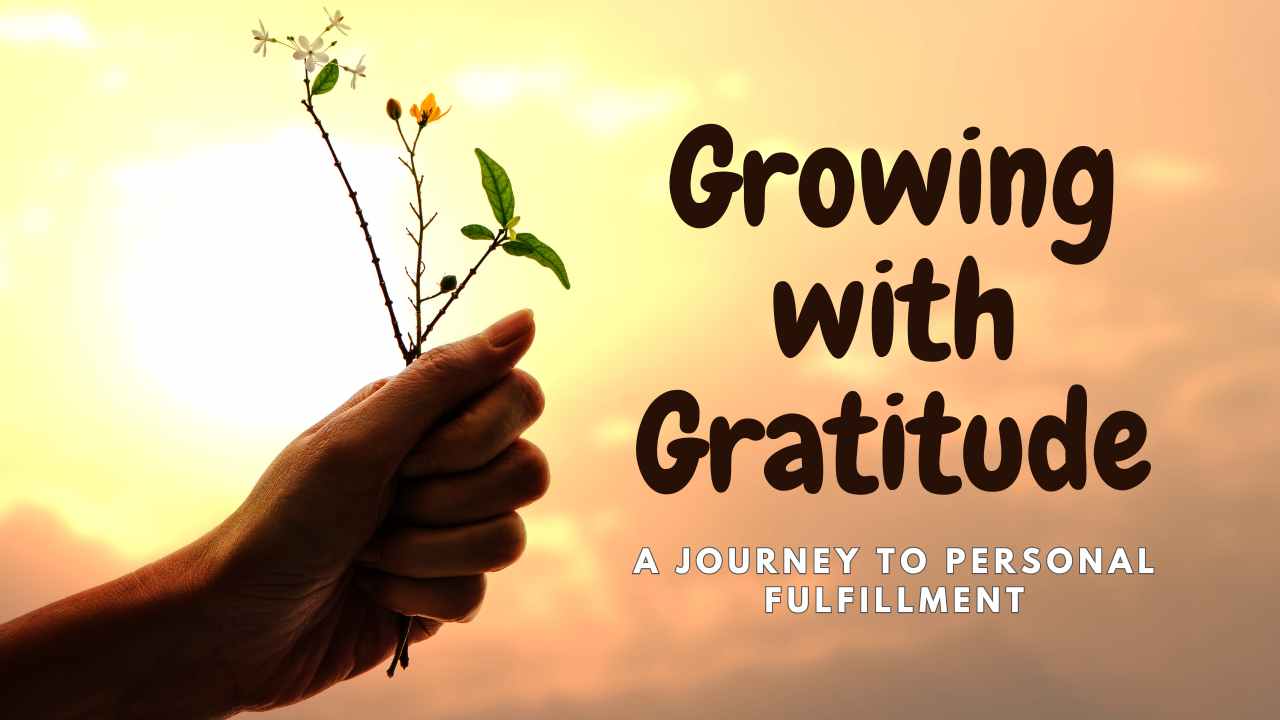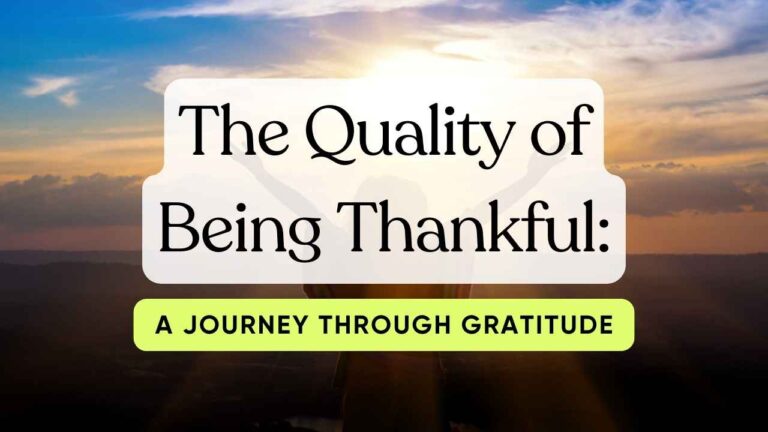Growing with Gratitude: A Journey to Personal Fulfillment
Gratitude isn’t just a matter of manners; it’s a heart-and-mind affair, a transformative practice that can turn your life’s journey from a mere walk to a vibrant dance. It’s about finding joy in the mundane and learning to appreciate the rain as much as the rainbow. This deep dive into gratitude will show you how it’s not just an act of thanks but a pathway to a more fulfilling, happier life.
The Science Behind Gratitude
What’s Going On in Our Brains?
Gratitude is more than an emotional response; it’s a brain activity. When we express gratitude, our brain releases dopamine and serotonin, the neurotransmitters liable for making us feel good. This means that gratitude isn’t just a nice thing to do; it’s a brain-boosting powerhouse. Scientific studies consistently show that practicing gratitude can lead to a happier, more satisfied life. It’s like a workout for your brain, strengthening the pathways that lead to positive thinking and well-being.
Health Benefits: More than Just Feel-Good Vibes
The impact of gratitude extends beyond mental joy; it’s a key to physical well-being. Did you know that a heart filled with gratitude can be healthier? Research links gratitude with improved sleep, lower blood pressure, and a stronger immune system. It’s like a health supplement for your life, with side effects including smiles, deeper sleep, and a zest for life. When we embrace gratitude, we’re not just saying thanks; we’re giving our bodies a wellness boost.
Cultivating Gratitude in Daily Life
Everyday Mindfulness: It’s in the Little Things
Gratitude isn’t reserved for grand occasions; it flourishes in the small moments of daily life. It’s about noticing the beauty in the mundane, the extraordinary in the ordinary. When you start your day, take a moment to appreciate the warmth of the sun, the aroma of your morning coffee, or the smile of a loved one. These small acknowledgments are the seeds from which gratitude grows. By being mindful and present every day, you create a garden of gratitude in your life.
Journal Your Journey

Imagine a journal filled not with to-dos but with thank-yous. This simple practice can be a game-changer. Each night, write down three things you’re grateful for. They don’t have to be big; in fact, it’s the small things that often matter the most. This nightly ritual shifts your focus from what’s lacking to what’s abundant in your life. It’s like putting on gratitude glasses that change how you see the world, turning everyday experiences into treasures.
Turning the Tables on Negativity
Our brains are wired to witness the bad more than the good, a survival tactic that’s less useful in modern life. This negativity bias can be a downer, but gratitude offers a way to flip the script. Every time a negative thought creeps in, counter it with two positive thoughts. It’s like a mental game of seesaw, with gratitude tipping the balance towards positivity. This practice doesn’t just fight negativity; it trains your brain to seek out and celebrate the good.
Gratitude in Relationships
Thank You Goes a Long Way
Gratitude is a relationship superglue. It strengthens bonds, deepens connections, and spreads joy. When we express gratitude to others, we’re not just acknowledging their actions but valuing their presence in our lives. It’s about developing a positive feedback loop where kindness and appreciation flow freely. In both personal and professional relationships, a simple act of gratitude can light up someone’s day and forge stronger, more meaningful connections.
Beyond Personal Life
Gratitude isn’t confined to personal spaces; it thrives in professional environments too. A workplace where gratitude is expressed becomes a place of positivity and collaboration. It’s about creating a culture of appreciation where everyone feels valued and motivated. A simple thank-you can transform a routine workday into an opportunity for connection and growth.
Planting the Seeds Early
Introducing gratitude to children is like planting a tree; it grows roots of empathy and branches of kindness. Teaching kids to appreciate what they have and express thanks helps them develop a positive outlook on life. It’s not just about saying thank you; it’s about nurturing an attitude of appreciation that can shape their future selves.
The Challenges of Gratitude
Facing Misconceptions Head-On
Gratitude isn’t about ignoring life’s challenges but finding balance and perspective in the midst of them. It’s not a denial of difficulties but an acknowledgment of the good alongside them. Practicing gratitude doesn’t mean you’re never sad or frustrated; it means you don’t let those feelings overshadow the good in your life.
Realistic Expectations
Embracing gratitude doesn’t mean expecting life to be perfect. It’s about appreciating what is, not what could be. Gratitude helps navigate life’s ups and downs with a more positive outlook. It’s not a solution to all problems, but it can be a relaxing balm for the soul, making the tough times a little easier to bear.
Advanced Gratitude Practices
Spiritual and Philosophical Gratitude
Exploring gratitude through spiritual or philosophical lenses can be enlightening for those on a more profound quest. It’s about connecting with the larger tapestry of life, finding gratitude in the interconnectedness of all things. This approach goes beyond personal benefits, tapping into a sense of appreciation for the universe and our place within it.
Retreats and Workshops
Consider diving deeper into the sea of gratitude through retreats and workshops. These experiences can offer new perspectives and deepen your practice. They’re like a spa for the soul, providing a space to disconnect from daily distractions and reconnect with what truly matters.
The Broader Impact of Gratitude
A Greener Outlook
Gratitude extends its roots into our relationship with the environment. By appreciating the natural world, we become more conscious of our impact on it. It’s about seeing the earth as a resource and a source of wonder and gratitude, leading to more environmentally friendly choices.
Resilience in Tough Times
In life’s darkest moments, gratitude can be a beacon of hope. It’s about finding the silver lining, however faint, in the storm clouds of adversity. Gratitude doesn’t erase hardship but adds a layer of resilience, helping us navigate tough times with a steadier heart.
A Ripple Effect
Your gratitude can have a far-reaching impact, inspiring others to find their own reasons to be thankful. It’s like a pebble thrown into a pond, creating ripples extending far beyond the splash. This collective wave of gratitude can foster a more positive, interconnected world.
A Transformative Power
Gratitude isn’t just a feel-good practice; it’s a transformative force. It’s about seeing the world through a lens of appreciation, discovering joy in everyday moments, and understanding the beauty in imperfection. Gratitude isn’t just a habit; it’s a way of living that colors every experience with a hue of thankfulness.
Keep It Going
Gratitude, like any skill, grows stronger with practice. The more you practice, the more natural it becomes, transforming moments and your entire approach to life. Keep nurturing this habit, and watch as it blossoms into a lifestyle of fulfillment and joy.
Gratitude as a Lifestyle
Ultimately, gratitude is more than a practice; it’s a lifestyle choice. It’s about choosing positivity, spreading kindness, and embracing life’s journey with an open heart. So, are you willing to step onto this path? Remember, it’s not about where you are but how you view where you are. Start small, dream big, and watch as the world transforms with your gratitude. The journey to personal fulfillment starts with a simple yet powerful word: thank you.








4 Comments